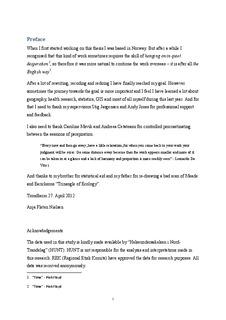| dc.description.abstract | There are lots of different ways of understanding health and disease. In this dissertation I have tried to explain different environmental and behaviour factors associated with self-rated depression based on the theoretical framework of "Triangle of human ecology". This explains state of health based on behaviour, environment and population factors.
The study aims to identify possible geographic patterns of depression and the distribution of other area variables like temperature, education level, urbanity etc. since these factors may have an indirect effect on depression. I also look at individual-based associations between the outcome variable, depression (HADS-D score, based on the Hospital Anxiety and Depression Scale), and associative variables (smoking, alcohol intake, physical activity etc.) by using logistic regression analysis. It is not possible to say anything about causal relationships since this requires information about the temporal ordering between the variables.
The empirical data is obtained from HUNT 3 (Health study in Nord-Trøndelag) from 2006-2008, Metorologisk institutt and various statistics from SSB (Norwegian Statistics).
The analysis show a positive association between HADS-D above 8 and being male, high age, CAGE-score above 2, neurotic personality, difficulties in childhood and self-reported imminent mortal danger the last 12 months. There is however a negative association between HADS-D above 8 and alcohol consumption, having a job, participation in music/theatre and outdoor activity, social support both on personal and neighbourhood level, exercise, extroversion, high temperature and life satisfaction. For people having a job being male, having high age, having high demands at work and short education seems to be positively associated with HADS-D score above 8, while high social support and high control seems to be negatively associated with HADS-D above 8. | nb_NO |
